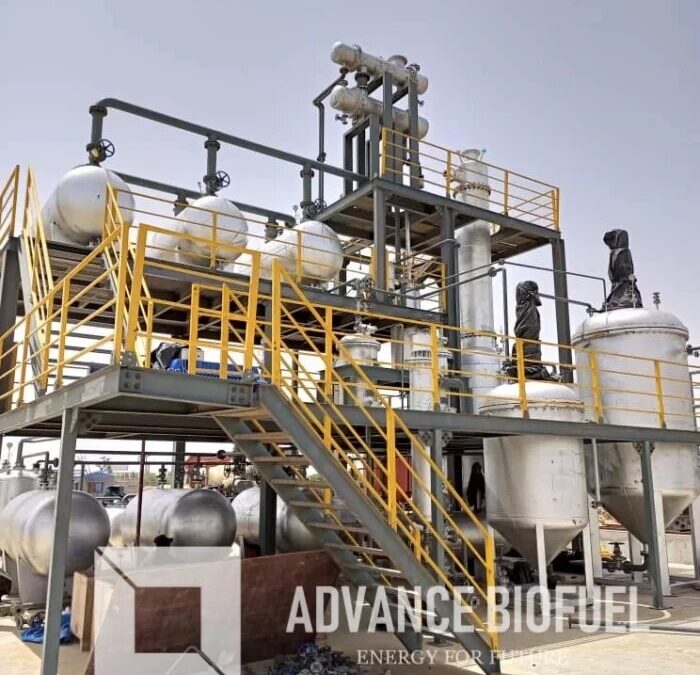In the global quest for sustainable energy sources, biodiesel has emerged as a promising alternative to traditional fossil fuels. Biodiesel production plants play a pivotal role in this transition, converting renewable resources such as vegetable oils, animal fats, and waste cooking oils into a clean-burning fuel. However, managing these facilities efficiently requires careful planning, innovative strategies, and a commitment to sustainability. In this article, we’ll explore key strategies for effective biodiesel production plant management, along with a spotlight on Advance Biofuel, a leading company in the field.
Introduction to Biodiesel Production
Biodiesel, a renewable and environmentally friendly fuel, offers numerous benefits, including reduced greenhouse gas emissions and decreased dependence on finite fossil fuel reserves. Biodiesel production typically involves the transesterification process, where triglycerides from feedstocks like soybean oil or recycled cooking oil react with alcohol (usually methanol or ethanol) in the presence of a catalyst to produce biodiesel and glycerol.
Key Strategies for Biodiesel Production Plant Management
- Optimizing Feedstock Selection: The choice of feedstock significantly impacts the economic viability and environmental sustainability of biodiesel production. Plant managers must carefully evaluate available feedstock options based on factors such as cost, availability, sustainability, and compatibility with existing processing equipment. Diversifying feedstock sources can enhance resilience to market fluctuations and supply chain disruptions.
- Efficient Process Design and Automation: Implementing state-of-the-art equipment and automation technologies can streamline production processes, minimize resource wastage, and improve overall efficiency. Continuous monitoring and control systems help optimize reaction parameters, ensure product quality, and reduce operational costs. Advanced process simulation tools enable plant managers to optimize plant design and layout for maximum throughput and energy efficiency.
- Sustainable Resource Management: Sustainable practices are essential for minimizing environmental impact and ensuring long-term viability. Plant managers should focus on reducing energy consumption, water usage, and waste generation through measures such as energy-efficient equipment upgrades, water recycling systems, and waste valorization initiatives. By implementing circular economy principles, biodiesel production plants can maximize resource efficiency and minimize environmental footprint.
- Quality Control and Compliance: Maintaining stringent quality control standards is crucial for ensuring product integrity and regulatory compliance. Biodiesel production plants must adhere to industry standards and regulatory requirements governing fuel quality, safety, and environmental performance. Comprehensive quality assurance protocols, including regular testing and analysis, are essential for detecting and addressing any deviations from specifications promptly.
- Supply Chain Optimization: Effective supply chain management is essential for securing reliable feedstock sources, minimizing transportation costs, and ensuring uninterrupted production operations. Establishing strategic partnerships with suppliers, distributors, and logistics providers can enhance supply chain resilience and flexibility. Leveraging digital technologies such as blockchain and IoT sensors enables real-time monitoring of supply chain activities, improving visibility and transparency.
Spotlight on Advance Biofuel
Advance Biofuel is a pioneering company at the forefront of sustainable biodiesel production. With a commitment to innovation, efficiency, and environmental stewardship, Advance Biofuel has established itself as a trusted partner in the renewable energy sector.
- About Advance Biofuel: Founded in 2012, Advance Biofuel operates state-of-the-art biodiesel production plants equipped with advanced technology and automation solutions. Our facilities are strategically located to access a diverse range of feedstock sources, including soybean oil, palm oil, and recycled cooking oil.
- Sustainable Practices: At Advance Biofuel, sustainability is ingrained in our corporate ethos. We prioritize the use of environmentally responsible feedstocks and employ energy-efficient production processes to minimize our carbon footprint. Our commitment to sustainable resource management extends to waste valorization initiatives, where glycerol by-products are repurposed for various industrial applications.
- Quality Assurance: Quality is paramount at Advance Biofuel. We adhere to rigorous quality control protocols to ensure that our biodiesel meets the highest industry standards for purity, performance, and regulatory compliance. Our dedicated quality assurance team conducts comprehensive testing and analysis at every stage of the production process, from feedstock procurement to final product distribution.
- Innovation and Technology: Advance Biofuel embraces technological innovation to drive efficiency and productivity. Our investment in cutting-edge equipment, process automation, and data analytics enables us to optimize production operations, reduce costs, and enhance competitiveness in the market. We continuously explore new technologies and research initiatives to further improve our processes and products.
- Community Engagement: Advance Biofuel is committed to making a positive impact beyond our operations. We actively engage with local communities, educational institutions, and industry partners to promote awareness of renewable energy and foster sustainable development initiatives. Through outreach programs and partnerships, we strive to empower communities and contribute to a greener, more resilient future.
Conclusion
Effective management of biodiesel production plants requires a holistic approach that integrates technological innovation, sustainable practices, and regulatory compliance. By implementing strategies such as optimizing feedstock selection, enhancing process efficiency, and prioritizing sustainability, biodiesel producers can drive growth, reduce environmental impact, and contribute to a more sustainable energy future. As exemplified by Advance Biofuel, companies that prioritize innovation, efficiency, and environmental stewardship are leading the way towards a cleaner, greener world.


